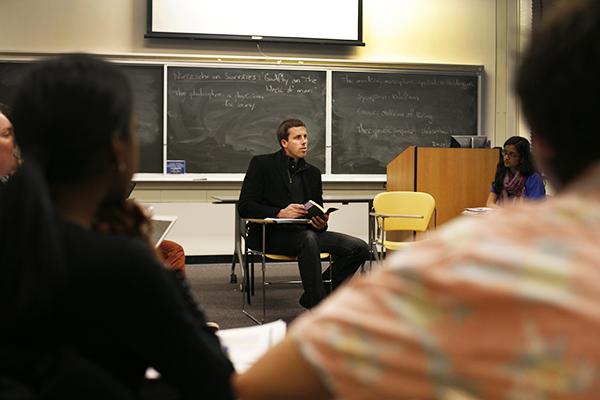Updated April 28, 2014
On many afternoons in the University Honors Program townhouse this past year, students have watched marathons of “The West Wing”, studied alongside their professors and spent hours talking with their advisers about course schedules, careers and life.
But when many of the program’s roughly 500 students travel between Foggy Bottom and the Mount Vernon Campus every day for classes, that community feel stays put in its “center of gravity” on 21st Street, director Maria Frawley said.
The University has increasingly housed honors students on the Vern after the program moved one of its offices there two years ago. After initial student pushback against the change, the program has worked to fill the disconnect between campuses.
That effort will accelerate after the community was shaken by the suicides of two honors freshmen in West Hall this semester. Honors faculty will spend the summer looking at how to help students form closer ties with their peers and their professors, such as stronger one-on-one advising and more off-campus trips like theater performances and hikes through the Shenandoah Valley.
Frawley, who has run the program for about five years, will ask for a budget increase to hire more full-time staff in its Vern office, which she hopes will make the Ames Hall suite more of a destination for students.
“We constantly have students streaming in just to hang out, and it would be nice for our Mount Vernon suite to become similarly occupied, in a way,” Frawley said in an interview in the program’s Foggy Bottom townhouse.
The elite program, which has an about 7.5 percent acceptance rate, also plans to host more events like pumpkin-carving and gingerbread house-making, which students say they still remember years later.
Mark Ralkowski, a philosophy professor in the honors program, said he also wanted the program to help build a student center, which would strengthen its identity on the suburban campus about 15 minutes away.
As a faculty-in-residence in Somers Hall, Ralkowski said he would work more closely with the honors program’s resident advisers next year and is already planning more events for next fall, like a picnic at a local park. He said he’d eventually like to move into the honors housing in West Hall.
Some of those ideas came out of a two-and-a-half hour long meeting last month that gave students the chance to tell faculty and top administrators areas where the program needs improvement.
The meeting, which was attended by Provost Steven Lerman and led by Frawley and program coordinator Catherine Chandler, was a venue for students to voice suggestions for improving the program.
Overcoming the disconnect between the two campuses is something the University has struggled with for years. Frawley said the program’s coordinators cannot try to compete with the Foggy Bottom Campus while attracting more students to the Vern, but rather try to show off its advantages.

We have to market Mount Vernon as offering, in addition to everything GW already offers through its fabulous Foggy Bottom campus, some real advantages: a lot of grassy space, this wonderful smaller library,” she said.
Sophomore Fatema Ghasletwala said she remembers countless hours studying in the townhouse basement and planning out her course schedule with her advisers, moments that have defined her honors program experience.
“A lot of the friends I made to this day I met first semester freshman year in the basement of the townhouse for study hours,” she said.
The honors program would also tweak its mentorship system, pairing each new student with an upperclassman. Currently, two upperclassman mentors work with each class section, which includes about 15 students.
The group aims to balance the community feel of a small liberal arts college with the reasons honors students choose GW over top-ranked universities, like internships and being in the middle of a city.
The program accepts about 150 students each year, though it typically receives about 2,000 applications. Faculty have tried to improve its retention by making the program more flexible in the last few years.
Still, in the wake of two deaths within the program, Ralkowski said he has seen students grow closer together. He added he has gotten closer to students who have leaned on the honors program to cope through their grief.
“I feel awestruck by the kind of character I’ve seen in the freshman. They almost feel like mythical heroes after some of the challenges they’ve had,” he said.
– Eva Palmer contributed reporting.
xThis post was updated to reflect the following:
Correction appended
The Hatchet incorrectly reported that about 600 students are in the University Honors Program. The program has about 500 students.







